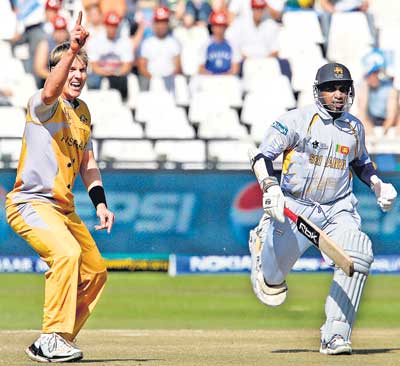
Lay to rest the ghosts of Africa
With happy experiences of the 2007 World Cup fresh in our minds-even if we lost at the final hurdle, few would have faulted us if we had great expectations about the Twenty-20 World Cup in South Africa. After all, innovative batting has always been Sri Lanka’s strength in the shorter versions of the game and if we had a weakness, it would have been in the bowling and the Twenty-20 format appeared to have been tailor made for the style of game that we play. But as events last week went horribly wrong, it was not to be and we found ourselves making an early exit from the tournament and on a flight to Colombo. I believe things began to go wrong in the game against Pakistan. It was a key match and Pakistan were minus quite a few of their established stars for a variety of reasons. In terms of experience we clearly had the advantage but it was up to us to convert it to a win that day-- a win, with a game to play against Bangladesh that would have meant almost certain passage through to the semi finals.
Pakistan themselves began disastrously, losing three wickets early to be 33 for three in the sixth over with Vaasey and Dilhara bowling superbly. Then, Shoaib Malik and Younis Khan settled down for a hundred run partnership in less than ten overs to shift the advantage. I wrote last week how challenging it was to be the main spinner in squad in absence of Murali. Malik and Khan appeared to have decided to go after my bowling and I ended conceding 64 runs in my four overs, not an experience I would cherish. Finally, our target was a 190 to win. Any thoughts I had of repairing the damage with the bat disappeared when I was bowled by the newcomer Sohail Tanvir for 5, but unfortunately the others also found the Paksitani attack difficult to cope with. Unlike in the Pakistani innings, whenever one of our batsmen looked like repairing the damage a wicket was lost. Again, we had a plan for one of the top four batsmen to carry through to the end of the twenty overs but that didn’t happen. No one scored a fifty and only Mahela, Chamara and Dilshan contributed scores of significance. At the end of the day, we lost by 33 runs. One aspect of the twenty-20 game and this tournament in particular is the short interval between matches. The game against Bangladesh was on the very next day, giving us very little time to rethink and regroup. It also meant that batsmen and bowlers had little time to make technical adjustments to the prevailing conditions or even have a long session at the nets to get their confidence restored. This is what we realised when we batted against Bangladesh. I was again dismissed for a duck. The top order, all of them, got set and then got out. It was left to Dilshan and Jehan to give some respectability to the score by adding 51 runs in five overs to pose a total of 147. During our innings we realised that this particular wicket at the New Wanderers Stadium was not easy to bat on but even then we reckoned a target of less than 150 would not be imposing. We discussed this during the short innings break and told ourselves that the bowling and fielding would have to be spot on if were to make match of it. Of course, we all knew that a loss to Bangladesh would not only dent our confidence badly, it would also signal our exit from the tournament. Our strategy worked exactly as we planned and Vaasey and Dilhara were able to deliver. Bangladesh folded up for just 83 runs. They are a young and talented side but in this instance, their inexperience showed. We lived to fight another day-but that was to be a do or die battle against world champions, Australia. First though, we had to travel the nearly 900 miles from Johannesburg to Newlands, Cape Town. Australia had played all their previous games at Cape Town, just as much as we had played all our previous games at the Wanderers, so we knew this would be to their advantage. The match was scheduled for a 10 o’clock start but when we came out of our hotel at 7.30 in the morning we could hardly see each other in the thick fog. There was also a lot of dew on the wicket, so the toss was crucial even if the fog did disappear by the time the game began under bright sunshine. Gilchrist who was standing in for the injured Ponting won the toss and as expected the Aussies put us in. My lean form with the bat continued as I was ruled out LBW to Brett Lee in the second ball I faced and I thought I was unlucky but that is part and parcel of the game. We all knew the conditions were difficult to bat on, but that is not an excuse for our batting display. We have a very experienced batting line up and we should have adapted to the conditions and we should have played better. Our shot selection was poor and our batsmen, including myself, should take responsibility for what followed. Once again, the batsmen either threw their wickets away or got reasonable starts but didn’t convert them into a bigger score in a game that we absolutely needed to win. We needed to be more careful with our stroke play, especially early in the innings, in difficult batting conditions and we weren’t. In a sense, this game taught us a valuable lesson. Much has been said of how the Twenty-20 game suited our brand of attacking cricket. While there is some truth in that assumption, this game showed us that especially in this extra-short version of cricket, ground conditions needed to be gauged first before embarking on adventurous stroke play. We didn’t do that and we paid the price. A target of a 101 was never going to test Australia and that was how our tournament ended. Personally, it was one of the worst games I ever played and it is a game I would want to forget remembering only the lessons we learnt from it. Overall too, how I would remember the Twenty-20 tournament is as a learning exercise. We have to face the realities of world cricket: the Twenty-20 format proved very popular because an entire match is over in three hours. Therefore, it is commercially very attractive for the game’s administrators and more and more of this format of the game will be played in the future. So, we need to adapt quickly. Twenty-20 games are played locally in our domestic calendar but that is at a time when most of our international players are not available and this will need to be looked at. As cricketers, we need to be able to play innovative shots and develop our technique to cope with the fast pace of the game. Personally, I had a lean streak with the bat towards the end of the tournament after a couple of good games at the beginning. I am not too worried about that as my dismissal against Pakistan was to a very good delivery; against Bangladesh I hit out and that is the way I play and against Australia I was a trifle unlucky. I will think of my future tour by tour and assess how I perform. I feel that is the best way to decide about my future at this stage of my career. The boys are all keen to do well against England in the five match one-day series which begins next week and to lay to rest the ghosts of South Africa. As you read this on Sunday morning, we will be arriving from South Africa and we go back to practices on Tuesday. It is not easy being a professional cricketer but I find that I still enjoy playing for my country, as I used to when I first began my international career nearly twenty years ago! |
|| Front
Page | News | Editorial | Columns | Sports | Plus | Financial
Times | International | Mirror | TV
Times | Funday
Times || |
| |
Reproduction of articles permitted when used without any alterations to contents and the source. |
© Copyright
2007 Wijeya
Newspapers Ltd.Colombo. Sri Lanka. All Rights Reserved. |

